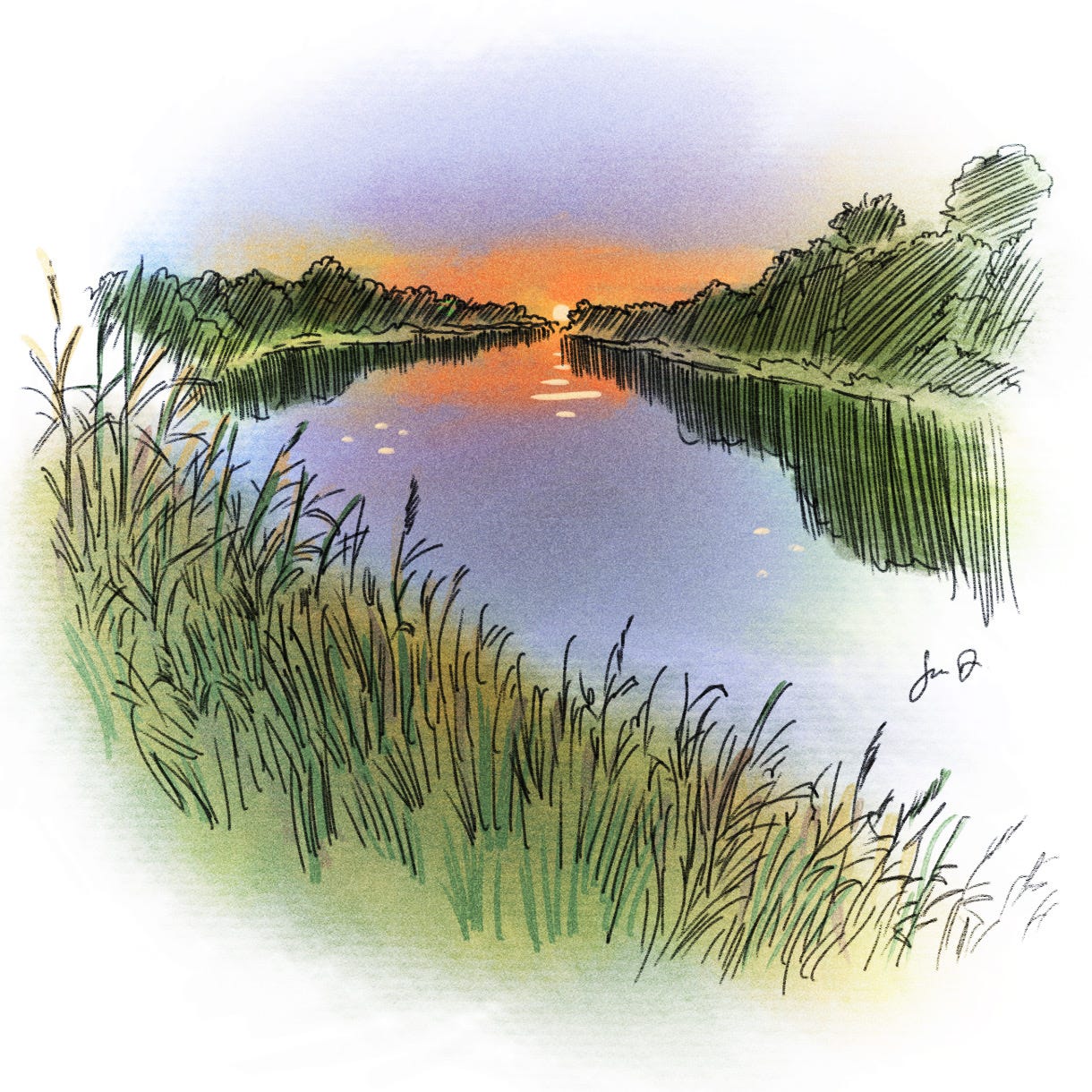This story is not mine. But it was told to me by a 92-year-old woman who lived it.
She was a little girl. It was the Great Depression. Although nobody called it the Depression back then, inasmuch as nobody knew what depression was. They just called them Hard Times.
And times were sure enough hard. Her family lived on the river. It was a rural life. Times were rough. Money was tight.
There were ducks who came by the river every day. A mama duck and all her younglings. The little girl loved these ducks. She waited for them every day, and she saved bread from breakfast, dinner, and supper so she could feed them.
Every time the little girl would sit at the suppertable, and bread would be served, she would hoard her bread into her pockets and save it. Then, she would go outside, wander to the riverbanks, and throw bread to the ducks.
The ducks were always waiting for her. They would eat the bread all up.
Over time, she saw the baby ducks grow bigger. And she was feeding them more and more bread. And sometimes she would go into town and buy bread with her nickels and dimes, and scatter it into the water so the ducks could eat.
One day, the girl noticed that there was one duckling missing from the little family. She was so troubled by this that she walked into the woods, combing the banks of the river, looking for the lost duck. It was a fool's errand, of course.
“There was no way I could find a lost duck in those woods,” she said.
But she did.
She found a duck stuck in a little mud pit. The baby duck was hardly moving. But it was still alive. Although barely. So the girl took the duck home. She washed it off. The duck was weak, and would barely breathe.
“My Granny told me the duck would die.”
Even so, she kept it in her room, and she fed it corn, oats, rice, and birdseed. Whatever she could scavenge. She gave all her bread from the suppertable to the duck. She named him—why not?—Donald.
Eventually, the duck gained its strength. And one day, her Granny told her it was time to take the duck to the river and let it rejoin its family. So she did.
One morning, the girl took Donald to the river and placed it into the water with the others. And the little family of ducks all crowded the lost duckling, quacking, and showering it with what looked like affection.
“They were so glad to have their little brother back, it made me cry,” said the girl, who was no longer a girl when she told me this story.
The girl fed the ducks hunks of bread from her skirt pockets, just like before. And everyone ate. Everyone seemed very satisfied, and they all swam away.
Except the mama duck.
The mama duck waddled onshore and returned to the little girl. The mama duck stood there, fearless, only inches from the child, and looked right at the girl.
The little girl reached out to pet the mama duck gently, and the mama duck let her. After a few moments, the duck dropped an object from its mouth onto the shore, then backed away from it.
It was a white hunk of bread, lying there on the sand.
The little girl picked up the bread and said, “For me? Thank you.”
The duck just made a grunt, and got back into the water.
“I don’t know if this is a good story,” said the old woman. “But I thought I’d share it with you just the same.”
And I, for one, am glad she did.






Oh, how sweet! I love this story. ❤️. It is not at all hard to believe either because every animal I’ve rescued has shown me something similar, whether through loyalty, adoration, protection or imprinting. One July my youngest daughter and I found a tiny bird on a very hot sidewalk. Its eyes were still closed and it had no feathers. Its feet were deformed so I assumed it had been rejected by its mother. We got a small shoebox and soft cloth and placed the bird inside. I did some research and found that I could soak dry dog kibble in water and thin it enough to use a dropper to feed the baby bird. My goodness, it worked wonders! I hand raised the bird, feeding it four to six times a day, even during the night when it was very young. It opened its eyes and began growing feathers and began chirping a peep-peep sound so I named it Peep. I borrowed a bird cage from a friend and soon realized Peep could not perch because of the deformity in its feet. Peep was a beautiful mockingbird with an equally beautifully repertoire of songs. Early on, I tried unsuccessfully to release Peep, but the lack of perching ability placed Peep in great danger. He/she would not have lasted one day in the wild. Alas, we were to be a family. Every day I came home Peep got very excited, chirping, singing and jumping around the cage...imprinting on me, for sure. I began ordering live meal worms online and for years, Peep feasted, flew around the house and played on the floor with my two young girls. Animals are some of God’s greatest gifts. Thank you for sharing, Sean!
Yep, that's a good story. Animals have familial instincts and love. She knew the girl saved her baby and that she could trust her.